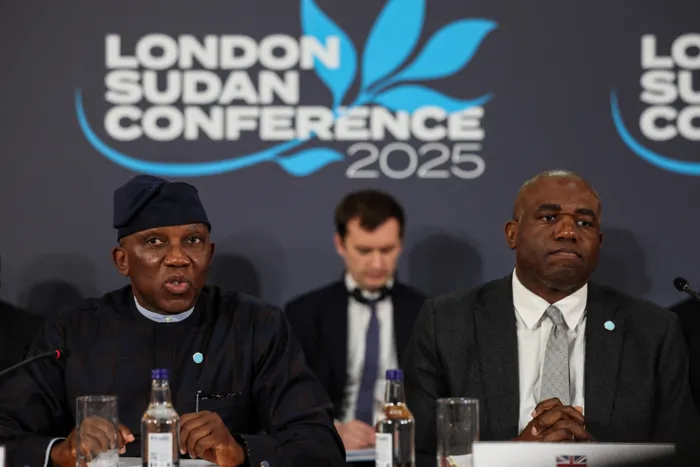Inclusive pathway only route to silencing Sudan's guns
PEACE AND SECURITY

Bankole Adeoye, (left), African Union Commissioner for Political Affairs, Peace and Security and Britain's Foreign Secretary David Lammy at the London Sudan Conference 2025 at Lancaster House in London on April 15, 2025. London provides an opportunity for the international community to reverse its abject failures by recommitting to promoting a credible and effective peace process for Sudan, says former President Thabo Mbeki.
Image: AFP
Former President Thabo Mbeki
SINCE the outbreak of the war between the Sudan Armed Forces and the Rapid Support Forces in 2023, I have held frequent virtual consultations with representatives of the Sudanese political parties, civil society leaders, and humanitarian actors.
I held one of these consultations shortly before the 15 April 2025 London Conference on Sudan.
I am honoured to convey this message on behalf of my Sudanese interlocutors.
Today, we mark a grim milestone: it is two years since Sudan descended into a destructive war that has torn asunder the fabric of Sudanese society, devastated lives, displaced millions, and brought one of Africa's most vital nations to the brink of famine and state collapse.
But even as we deliberate in London, the violence and devastation continue, with harrowing news of fresh atrocities, including in North Darfur.
Therefore, this cannot be just another anniversary for wringing hands. We must, together, seize this moment to prioritise action courage and coordination over apathy, drift and division.
London must mark the beginning of a serious and sustained effort to silence the guns across Sudan, to meet the complex needs of a society reduced to the indignities of hunger and abject deprivation, and, most importantly, to catalyse a credible effort of peace-making that privileges the voices and agency of the Sudanese people.
The world has failed Sudan through its paralysis, inaction, and, in some cases, complicity in aggravating the violence that is inflicting so much misery on the Sudanese people.
Our efforts to respond to the conflict have lacked coherence and political clarity. They have often been piecemeal, reactive and duplicative.
Sudanese who invested their hopes in the multilateral system - with its long record of engagement in Sudan - have been bitterly disappointed and disturbed by its inability to muster credible leadership and leverage, or to make its norms and peace-making capacities count in Sudan.
The message from our Sudanese consultations is clear.
First, there is no military solution. This war is simply unwinnable, and it is destructive. Neither the Sudan Armed Forces nor the Rapid Support Forces can achieve a decisive victory over the other. Continued conflict is bleeding Sudan, deepening polarisation, and imperilling the very survival of a nation. Meanwhile, militia rule is spreading, social cohesion is collapsing, even as civilians pay a heavy price for predation.
Ending the violence must be our top priority. This also means we must urge the various regional and international enablers of Sudan's conflict to desist immediately.
Second, with millions at risk of starvation and with basic services disrupted, we must act to deliver humanitarian assistance to meet multiple needs across Sudan, and of refugees.
The belligerent parties must be urged to fulfil their obligations to ensure humanitarian assistance reaches those in need and stop blocking, delaying and politicizing humanitarian access.
Sudanese initiatives - both domestic and from the diaspora - to alleviate the humanitarian crises, must be supported, including the resilient work of the Emergency Response Rooms.
But even as efforts to silence the guns continue, civilians and civilian infrastructure must be protected from attacks, reprisals, and ethnic cleansing. Women have borne the brunt of the conflict, including appalling sexual violence, which must be stopped.
The use of hunger as a weapon of war must be condemned and ended. We must insist upon the parties' respect for international humanitarian law and insist that perpetrators are held to account.
Third, Sudan desperately needs a credible and inclusive political process capable of delivering an end to the violence, and charting pathways for transition, reconciliation and reconstruction.
In this regard, multilateral engagement should be reinvigorated under the auspices of the African Union, with close support from IGAD, the United Nations, and other stakeholders, to revive a tradition of inclusive Sudanese political dialogue.
Any peace process should confront the root causes of Sudan's complex crisis, and the reality of current polarization, and seek to address the range of contemporary drivers of conflict, including the role of regional African and international actors.
Our peace-making must also mobilise support for recovery and reconstruction. Sudan will need the active accompaniment of the region and the international community for many years to come.
We must move decisively and with greater coherence, harnessing the diplomatic and other resources at our disposal, to facilitate effective dialogue among the Sudanese
stakeholders. Under the African Union leadership, a multilateral framework, with a common strategy, should provide the leadership for a process that makes the most use of our respective comparative advantages and complementarities.
The effective participation of Sudanese stakeholders is central to the success of such an endeavour.
Multiple mechanisms of engagement, including informal and parallel engagements, will be needed to enable the voices of the broadest range of Sudanese civil, political, and armed actors to be heard.
London provides an opportunity for the international community to reverse its abject failures by recommitting to promoting a credible and effective peace process for Sudan.
We must seize this moment. We owe this to the long-suffering people of Sudan, who have demonstrated extraordinary resilience in the face of relentless pain and suffering.
The least this conference can offer them is unwavering solidarity and engagement. Let this anniversary be the last one marked by war.
* This is an edited version of Former President Thabo Mbeki's report to the London Conference on Sudan, on April 15, 2025.
** The views expressed do not necessarily reflect the views of IOL or Independent Media.